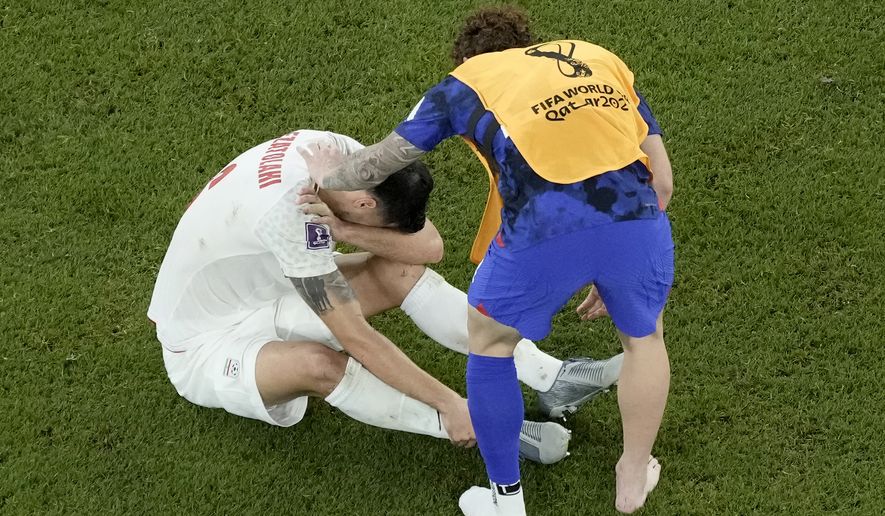OPINION:
The United States men’s soccer team defeated Iran recently in a much-watched match in Doha, Qatar. I am not a huge fan of soccer or what sports fans outside of the United States refer to as football. But I watched this match because it interested me. Aside from being an artilleryman in the Army, I was also a Middle East foreign area officer. My master’s thesis focused on the relationship between the U.S. and Iran during the run-up to the Iranian Revolution in 1979.
That relationship has been troubled at best and hostile at worst. There is much ill will between our two nations. In the post-WWII environment, the U.S. and Britain were displeased with the rise of a government in Iran headed by Mohammad Mosaddegh, an author, lawyer and politician who served as prime minister of Iran from 1951 to 1953. We set in motion a coup to overthrow him.
As you can guess, the U.S. and the U.K. were concerned about oil and the ability of Western powers to influence events in Iran. The shah, Mohammed Reza Pahlavi — inclined to be very accommodating to the U.S. and the U.K. — would continue to reign from 1941 until he was deposed during the Iranian Revolution in 1979. Better, we thought in 1953, to have a monarch we could control rather than an elected prime minister that we couldn’t.
But in time, the shah’s unwillingness to introduce land reform and other populist policies provoked a revolution that led to the rise of the Islamic Republic. It was enormously hostile toward the U.S. Indeed, its first action was to seize the U.S. Embassy and hold 52 Americans hostage for 444 days. That event ironically led to the fall of another politician, President Jimmy Carter, whose poor handling of the crisis resulted in his defeat in 1980 by President Ronald Reagan.
Since then, the relationship between the U.S. and Iran has been acerbic. To make matters worse, Iran has become increasingly hegemonic, fostering terror in the Middle East, pursuing nuclear weapons, and manifesting a profound hatred of Israel, America’s most trusted ally in the region. So, our soccer match with Iran held my interest, not so much as a matter of sport, but as a competition between two bitter opponents. As I watched the game, I couldn’t chase from my mind how Iran had funded and instigated the use of thousands of roadside bombs that wounded, maimed and killed U.S. soldiers and Marines throughout our intervention in Iraq. No soccer match win can compensate for that loss.
Therefore, I didn’t celebrate our sports victory. It was little more than cold comfort. And then a remarkable thing occurred that lifted my spirits and made me particularly proud to be an American. At the end of the game, Iranian midfielder Saeid Ezatolahi sat down on the field and wept. Shortly thereafter, American forward Josh Sargent — who had battled him throughout a first half that facilitated the only goal the U.S. would score, by Christian Pulisic — empathized with Mr. Ezatolahi.
Both he and Mr. Pulisic came over to comfort the devastated Iranian. On an emptying field in Doha, the light of camaraderie overcame the darkness of a conflict between the U.S. and Iran that has worsened over the years. These young men seemed to transcend it in a moment that should cause the U.S. to think about what it must do to change the course of its relationship with Iran.
Today the Islamic Republic is in a near state of revolution. Its terror mullahs are presiding over a repressive dictatorship that threatens the region, imprisons innocent people, and murders women who express a desire to be free of the torment religious zealots in Iran impose on them. The revolutionary spirit in Iran has produced a froth of unhappiness that gives every indication that the days of rule by radical mullahs are teetering.
Sadly, the same U.S. hesitancy to support the Iranian Green Movement years ago is at work today under President Biden. Then, in what would be known as the Persian Spring, a political movement arose after the 2009 Iranian presidential election and continued into early 2010. The Iranian people were fed up with repression and the fraudulent election that had just occurred. President Barack Obama did nothing to encourage them. The revolution was suppressed. The tyranny continued.
But today there’s another revolution brewing in the streets of Iran. Again, the U.S. is pathetically silent. Until the U.S. and Iranian soccer match in Doha. There, the U.S. prevailed. Now it is time to help the Iranian people prevail against their demonic regime. Not with our boots on the ground but with an unambiguous arm around the shoulder of a people too long repressed. In that regard, two American footballers showed us how.
• L. Scott Lingamfelter is a retired Army colonel and the author of “Desert Redleg: Artillery Warfare in the First Gulf War” (University Press of Kentucky). His new book, “Yanks in Blue Berets: American UN Peacekeepers in the Middle East,” will be released by UPK on 4 July 2023.




Please read our comment policy before commenting.